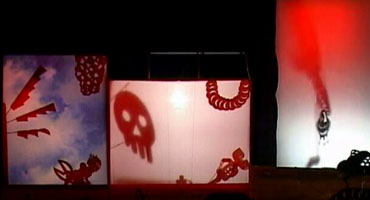
 I agree
I agree
.
Bungkusan Hati Di Dalam Kulkas [A Heart Wrapped inside the Refrigerator] (2008)
Dalang: Catur Kuncoro
Director: Eko Nugroho
How to cite: Catur Kuncoro and Eko Nugroho ([2008] 2016), Bungkusan Hati Di Dalam Kulkas [A Heart Wrapped inside the Refrigerator], translation and notes by . Singapore: Contemporary Wayang Archive. Retrieved from http://cwa-web.org/en/BungkusanHatiDiDalamKulkas.
Summary
News of a violent domestic crime are seen on a television screen. Cah Bagus and Cah Ayu are shopping for a second-hand car. They disagree but Cah Ayu wins the argument and they buy an elegant, second-hand car. The son of the seller is practicing a dance but faces strong criticism from this father. The father and Cah Ayu are having an affair. Cah Ayu is unhappy in her marriage and longs for a child. Cah Ayu argues with her husband and he gets her a dog. The sister of Cah Bagus warns him of the materialistic outlook of Cah Ayu. Cah Bagus discovers the affair and kills Cah Ayu. He tries to kill Cah Ayu's lover, but the lover's friends intercede and all of them die in a gunfight. The sister of Cah Bagus finds the son of the lover, still practicing dance, and comforts him.
Story: Contemporary Situation
Music: Electronic Music, Gamelan
Space: Modified Screen, Proscenium Stage
Performers: Single Dalang, Voice Actors
Puppets: Modified Traditional
Language: Indonesian
Recording details
Notes: Part of Eko Nugroho's Wayang Bocor series. Performed on 16 December 2008.
Produced by: Daging Tumbuh
Recording place: Komunitas Salihara, Jakarta
Addional credits
Stage Designer: Andy Seno Aji
Music: Yenu Ariendra
Text: Joned Suryatmoko
Lighting designer: Ignatius Sugiarto
Crew: Vindra Diratara, Darmanto Setiawan, Alia Swastika, Oki Permata Sari, Desi Suryanto, Sari Handayani, Cyka
View the metadata record for this resource.
The honorifics in the original languages were retained in the subtitles. In Javanese and Indonesian, speakers address their interlocutors with over 40 different honorifics which denote differences in their relative status and level of intimacy.
ID = Indonesian
JW = Javanese
Adik. ID. Younger brother/sister. It is used for addressing younger people, not necessarily one's relatives.
Adinda. ID. Younger sister. More intimate than adik.
Babé. ID/Betawi. Familiar form of father, commonly used in Jakarta.
Bé. ID/Betawi. Short form of Babé, father. Jakartan slang.
Bang. ID. Older brother, short form of abang. If used with non-relatives, it is has the connotation of a slang, and is somewhat equivalent to “man” in English.
Bĕndara. JW. Master.
Bibi. JW/ID. Aunt. A way of addressing/referring to older women.
Bos. ID/JW. An adaptation of the English "boss". Used either to refer to one's superior or to a friend in a joking context, for example, when a person orders others around without realizing he/she is doing so.
Bu. ID/JW. Short form of ibu, mother.
Bung. ID. Similar to bang, but slightly less formal. It might mean "comrade". The political leaders of the independence war are often referred to with this term, for example Sukarno is often referred to as
Bung Karno.
Dara. JW. Short form of bĕndara, master.
Dèn. JW. Sir, master, used to address royalty. Short form of radèn.
Dhé. JW. Short form of pakdhé, uncle.
Dhik. JW. Short form of adhik. Younger brother/sister. It is used for addressing younger people, not necessarily one's relatives.
Éyang. JW. Grandfather.
Dimas. JW. Younger brother.
Gusti. JW. Lord. Used to address superiors and Gods.
Ibu. JW/ID. Mother. Used generically to address women who are older than the speaker.
Kakang. JW. Older brother.
Kakang mbok. JW. Older sister.
Kanda. ID. Older brother. Formal.
Kang. JW. Older brother. Informal.
Kangmas. JW. Older brother.
Kaki. JW. Uncle
Kang. JW. Older brother, used generically for men older than the speaker. It is a shortened version of kangmas).
Kakak. JW/ID. Older brother/sister, used generically for people who are older than the speaker.
Lé. JW. Son, short version of tholé.
Lik. JW. Often used between friends as a slang term of address. Uncle, "little father." Short form of {paklik}.
Ma. JW. Same as pak, short form of rama.
Mbak. JW/ID. Older sister. Used generically for women who are slightly older than the speaker.
Mamang. ID. Uncle.
Mang. ID. Uncle, short form of mamang.
Mas. ID. Older brother, used generically for men who are older than the speaker. Although it is also a shortened version of the Javanese kangmas people prefer to use mas in Indonesian and kang in Javanese.
Mas bro. ID. Slang used among male friends. In a way, it is a reduplication.
Mbah. JW/ID Grandfather, grandmother. It is used generically to address people who are much older than the speaker. Short form of simbah.
Mbok. JW. Mother, short form of simbok. Used generically for women who are older than the speaker.
Mbokdhé. JW. Aunt. Literally, "big mother".
Mbul. JW. Informal term of address between close male friends.
Ndara. JW. Master.
Nduk. JW. Daughter, short form of gĕndhuk.
Nggèr. JW. Son, short form of anggèr Used generically for people who are younger than the speaker, with whom the speaker is on intimate terms.
Nimas. JW. Younger sister.
Nok. JW. West Javanese term for daughter, short form of dhénok.
Nona. ID. Miss, unmarried woman.
Paduka. ID. Your Excellency.
Pak. JW/ID. Father, used generically for men who are older than the speaker.
Pakdhé. JW. Uncle. Used to refer to a man who is older than one's father.
Paman. ID. Uncle. Used to refer to a man who is older than one's father.
Pangéran. JW/ID. Prince.
Prabu. JW. King.
Radén. JW. Master, used for royalty.
Rama. JW. Father. It can also be used to designate catholic priests when one is speaking in Indonesian.
Simbah. JW/ID Grandfather, grandmother. It is used generically to address people who are much older than the speaker.
Sinuwun. JW. Very formal way to address a man, reserved for sultans, kings and Gods.
Siwa. JW. Term for addressing older people.
Siwak. JW. Same as Siwa. Term for addressing older people.
Tholé. JW. Son
Tuan. ID. In colonial contexts, this is the way foreigners are addressed but it can also mean sir.
Wa Nĕrpati. JW. Uncle king, equivalent to the Indonesian paman raja.
Wa. JW. For addressing older people, short form of siwa.
Yayi. JW. Younger brother/sister.
Yunda. JW. Older sister.
See the Translation conventions.
Share:
in the translations or data.
